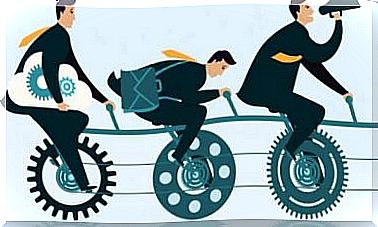5 Fatalistic Beliefs That Paralyze Us

Many people are unaware of their deeply ingrained fatalistic beliefs. At some point, these beliefs invade their consciousness, settle there, and affect their actions. Fatalistic people believe that their worldview is normal and therefore rarely question their ideas. However, if you delved deeper into these beliefs, you would find that they are unrealistic and unfounded.
The biggest problem with fatalistic beliefs is that they limit our horizons significantly. They are misconceptions disguised as truths and logical conclusions so that we can be mistaken about reality. And they weaken our will to change.
Little by little, these false beliefs anchor themselves in our collective unconscious. So too does society cling to these false beliefs because they seem to explain some of life’s challenges. Let’s take a look at the five most common fatalistic beliefs.
“Let’s not say, ‘Karma, karma. My karma led to it. ‘ Make an effort. Make an effort. We act consciously and with purpose. Let’s look for privation. Focus. Clean. Meditate. Let’s not be a fatalist. Let’s not be lazy. Let’s not bleat like a lamb. Let’s roar like a lion of Vedanta! “
Sri Swami Sivananda
1. We should blame and punish those who hurt us
This is a fatalistic belief that makes us seem childish in our relationships. Because it lets us assume that in many situations we are only passive victims of the actions of our fellow human beings. After all, it is much easier to play the victim than to tackle taking responsibility.

In this context, many conflicts end with an escalation of violence. Then the parties harm each other. It is also common for one or all of the parties to the conflict to be more concerned with “winning” the conflict or the victim game than trying to find a solution to the problem.
2. The external circumstances would be responsible for our misfortune, so our hands would be tied
In this case, we believe that negative experiences stem from invisible forces that are beyond our control. For some reason this calamity would haunt us. In other words, if we blame this outside force, we don’t have to take responsibility. It makes us victims of an accidental circumstance or fate. If we cannot control what is happening to us, why should we try in the first place?
In this situation, too, we assume that we are not the acting subject, but rather a passive object to which misfortune would happen. We renounce any responsibility for our actions and the freedom to direct our own lives. When we have such thoughts, we will ascribe everything that happens to outside influences. This way we avoid dealing with our own actions and mistakes.

3. It would be easier to ignore problems than to address them
Finding problems is as foolish as trying to avoid them. We constantly hear and see news that tells us to live simply and not get into conflict. This news tells us to leave things as they are and not cause any trouble. But that would only result in passivity and conformism.
Worst of all, ignoring them often makes our problems worse. Treating them in a timely and appropriate manner can ensure that we do not cause or suffer any permanent damage. Burying your head in the sand and waiting for something to happen can be a costly decision. We may be able to successfully suppress a problem for a while, but the consequences can be catastrophic.
4. Our fellow human beings would not do what they should
Some people choose to see the evil in the world as a logical consequence of the actions of others. Other people just aren’t doing what they’re supposed to be doing, and that’s why things don’t work. This fatalistic belief is not helpful. On the contrary, it seriously distorts reality.
This conviction also helps us to avoid responsibility. Of course, it is possible that our fellow human beings sometimes do not do what they should be doing. But that applies to us too, and not every evil can be explained by the mistakes of others.

5. It would be terrible if things didn’t go as we imagine
Fatalistic beliefs often take root in the hearts of self-centered people. Their self-centeredness prevents them from analyzing their own beliefs. That makes it difficult, if not impossible, for these people to accept that they are wrong about their opinion. This is why it is so easy to find selfish people who are frustrated because things are not going exactly the way they want them to.
That’s because they believe there is only one way to see the world and act: their way. When reality runs counter to their desires, they cannot accept it and refuse to experience the broadening of their horizons. Instead, they struggle against this reality and make no progress.
In conclusion, all of these fatalistic beliefs are harmful. They help prevent us from taking responsibility for our lives. Instead, these beliefs limit the freedom and autonomy we should all have.









